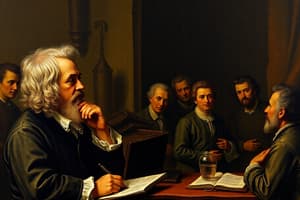Podcast
Questions and Answers
What did Hobbes believe was the primary purpose of the state?
What did Hobbes believe was the primary purpose of the state?
- To enhance individual freedom
- To maintain a social hierarchy
- To serve the individual by promoting security and order (correct)
- To limit personal rights for the common good
In Hobbes's view, what is the condition of individuals in the state of nature?
In Hobbes's view, what is the condition of individuals in the state of nature?
- They are primarily altruistic and caring
- They are driven by self-preservation and fear (correct)
- They are influenced by a social contract from birth
- They live in harmony and cooperation
What is the fundamental basis for Hobbes's idea of the social contract?
What is the fundamental basis for Hobbes's idea of the social contract?
- The relinquishment of freedom to a sovereign for security (correct)
- The establishment of democratic governance
- A natural evolution of human society
- An agreement to live in peace without a sovereign
How did Hobbes view the concept of law?
How did Hobbes view the concept of law?
What was Hobbes's stance on sovereignty?
What was Hobbes's stance on sovereignty?
What did Hobbes mean by 'the right of resistance'?
What did Hobbes mean by 'the right of resistance'?
Which philosophical approach did Hobbes adopt in analyzing political phenomena?
Which philosophical approach did Hobbes adopt in analyzing political phenomena?
Which of the following ideas directly contrasts with Hobbes's views?
Which of the following ideas directly contrasts with Hobbes's views?
What is the primary concern of Hobbes regarding government?
What is the primary concern of Hobbes regarding government?
What does Hobbes believe about human nature?
What does Hobbes believe about human nature?
In Hobbes's philosophy, what is the role of the absolute sovereign?
In Hobbes's philosophy, what is the role of the absolute sovereign?
Which form of government does Hobbes advocate for as the best?
Which form of government does Hobbes advocate for as the best?
What does Hobbes say about the social contract?
What does Hobbes say about the social contract?
How did Hobbes view religion in the context of government?
How did Hobbes view religion in the context of government?
What is the central idea of Hobbes's 'Leviathan'?
What is the central idea of Hobbes's 'Leviathan'?
What criticism did John Locke pose against Hobbes's theory?
What criticism did John Locke pose against Hobbes's theory?
What characterizes Hobbes's reasoning in his works?
What characterizes Hobbes's reasoning in his works?
Which statement aligns with Hobbes's view of life in the state of nature?
Which statement aligns with Hobbes's view of life in the state of nature?
Flashcards
State of Nature
State of Nature
A pre-social, pre-political condition where individuals are driven by self-preservation and fear, leading to a chaotic existence.
Social Contract
Social Contract
An agreement by individuals to surrender some of their freedoms to a sovereign in exchange for security and order.
The Leviathan
The Leviathan
A powerful entity, often symbolized as a giant, representing the absolute authority needed to maintain order and prevent chaos.
Sovereignty
Sovereignty
Signup and view all the flashcards
The Need for a Strong Sovereign
The Need for a Strong Sovereign
Signup and view all the flashcards
Self-Interest in Human Nature
Self-Interest in Human Nature
Signup and view all the flashcards
Scientific Method in Politics
Scientific Method in Politics
Signup and view all the flashcards
Law as the Will of the Sovereign
Law as the Will of the Sovereign
Signup and view all the flashcards
Leviathan
Leviathan
Signup and view all the flashcards
Security of the Individual
Security of the Individual
Signup and view all the flashcards
Absolute Monarchy
Absolute Monarchy
Signup and view all the flashcards
Human Nature (Hobbes)
Human Nature (Hobbes)
Signup and view all the flashcards
Sword as the Source of Authority
Sword as the Source of Authority
Signup and view all the flashcards
Religion and the Sovereign
Religion and the Sovereign
Signup and view all the flashcards
Hobbes's Methodology
Hobbes's Methodology
Signup and view all the flashcards
John Locke
John Locke
Signup and view all the flashcards
Study Notes
Thomas Hobbes: Key Ideas and Concepts
- Utilitarianism: Hobbes believed the state existed to serve the individual by promoting security and order.
- Individualism: He championed a strong, centralized government for order, recognizing individual rights, primarily self-preservation.
- Rejection of Aristotle's Ideas: Hobbes disagreed with Aristotle’s view of the state as a natural entity, arguing instead for a social contract origin.
- State of Nature: Hobbes described a pre-social state characterized by self-preservation, fear, and a "war of all against all."
- Social Contract: Individuals relinquish freedoms to a sovereign for security and order. This sovereign has absolute power.
- The Leviathan: Hobbes's book details the sovereign's power as essential for order, deterring the "state of nature."
- Sovereignty: Hobbes emphasized an absolute sovereign to prevent chaos and maintain stability, crucial for preserving safety.
- The Right of Resistance: Hobbes allowed resistance if the sovereign fails to protect individuals' lives and security.
- Self-Interest: Hobbes believed humans are inherently self-interested, pursuing power and survival.
- Influence of Galileo: Hobbes adopted Galileo’s “composite” concept, viewing individuals as components creating society and the state.
- Scientific Method: Hobbes used a scientific approach to understand political phenomena, drawing from observations of the state of nature.
- Law as the Will of the Sovereign: Hobbes saw law as the expression of the sovereign's will, supporting absolute rule.
- The Importance of Education: Hobbes believed in education's role in shaping responsible citizens within established societies.
- A Paradox: Hobbes's emphasis on individual self-preservation in the face of tyranny, simultaneously advocating absolute sovereignty, highlights a key tension in his theory.
- A Controversial Figure: Hobbes's ideas about absolute sovereignty remained highly debated and controversial.
Thomas Hobbes and the Leviathan
- Thomas Hobbes: A founding figure of modern political science, born in 1581 during the tumultuous English Civil War, his life was shaped by political instability.
- Human Nature: Hobbes believed humans are inherently selfish and driven by a desire for power.
- State of Nature: In the absence of government and laws, Hobbes envisioned a state of nature where life is "solitary, poor, nasty, brutish, and short."
- The Leviathan: This powerful sovereign (ruler) is the only solution to escape the state of nature.
- Security of the Individual: Hobbes saw the primary role of government as safeguarding lives and property.
- Social Contract: Individuals voluntarily submit to a sovereign to achieve peace and security, creating a mutual agreement.
- Social Contract Agreement: Citizens surrender rights for the sovereign's protection, retaining self-defense as a last resort.
- Purpose of the Leviathan: Maintaining peace, security, and order is the sovereign's primary responsibility.
- Best Form of Government: Hobbes advocated for absolute monarchy, believing it fosters stability and prevention of the return to the chaotic state of nature.
- Leviathan's Foundation: Hobbes' work was rooted in reason and logic, based on observations of human nature and English history, rather than empirical evidence.
- Authority: The sovereign's power, symbolized by the sword, establishes the source of authority and enforces laws and morality.
- Religion: Hobbes viewed religion as a potential source of conflict and saw the sovereign as having the power to manage religious matters.
- Controversy: Hobbes's ideas faced opposition and were deemed controversial during his lifetime.
- Later Criticism: John Locke later criticized Hobbes's theory, disagreeing with the absolute surrender of rights to the sovereign.
- Influence: Hobbes's philosophy has significantly shaped Western political thought since the 17th century.
Studying That Suits You
Use AI to generate personalized quizzes and flashcards to suit your learning preferences.




